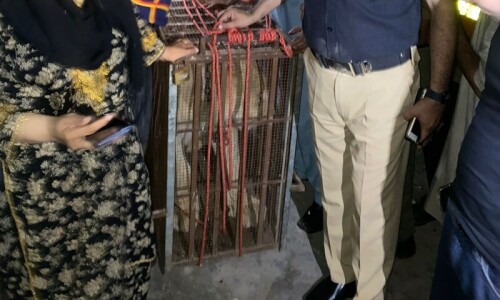KARACHI: As the law started to take its course in the lion’s case on Wednesday that saw five suspects being granted bail by a court, experts raised concern over the well-being of the big cat that was rescued, along with a tortoise a day earlier, from Sharea Faisal and moved to the Karachi Zoological Garden late Tuesday night.
Sources said the big male cat was around one year old and had been raised as a pet, though illegally.
“It seems to be highly tamed as he didn’t inflict serious injuries to anyone during the operation. This is why it’s important that he is handled with due care and attention. Unfortunately, the zoo lacks trained staff and this may affect his health,” a zoo official said, wishing not to be named.
According to him, the zoo is the lone beneficiary from the dramatic operation carried out on the city’s busiest road a day earlier.
“The zoo has gotten a young lion without spending a single penny. If looked after well, the newcomer may help the facility increase the number of its big cats,” he said, adding that the zoo was left with two lionesses (of Panthera Leo species) after losing the lone male member last year.
Concerns raised over welfare of ‘pet’ big cat spending rest of its life in zoo
Sources said the first day was tough for the visibly depressed lion as he remained confined to a corner of its cage almost the whole day despite getting a lot of media attention.
“He hardly moved and apparently ate very little today. The people responsible for his fate are out on bail while the poor animal is likely to spend rest of his life at a facility that doesn’t offer good care to its inmates, resulting in frequent disease outbreaks and mortalities,” another zoo official shared.
According to sources, the zoo has been hosting traumatised rescued animals for decades since the wildlife department doesn’t have a dedicated facility for such animals.
“There is a long list of animals that were brought here (by the wildlife department) and passed away in few years. Often such animals were kept in poor conditions and there are mortalities during operations,” an expert said, emphasising the need for inducting more staff at the zoo and providing them with the much-needed training in animal care.
He also expressed the possibility of animal abuse at the hands of lion’s handlers and said that there should be a complete physical examination of the lion that’s possible only after sedating him.
“Big cats are instinctively ferocious. Often, these animals are declawed and made fangless by their handlers raising them in illegal captivity. This cruel practice makes them vulnerable to infections and they are stated to have shorter lifespan than their counterparts in the wild.”
Zoo director Iqbal Nawaz wasn’t available for a comment despite repeated attempts made by this reporter to contact him.
Speaking to Dawn, Sindh Wildlife Conservator Javed Ahmed Maher agreed with concerns regarding welfare of rescued animals and said that the province needed a rehab facility for rescued animals.
“We are gradually moving towards that direction. The first step was to have an updated law that provides protection to all species and covers related sensitivities and that we have achieved. Now, it’s in the enforcement phase,” he said.
Efforts, he said, were underway to identify people illegally keeping big cats and other animals in captivity and that, too, in residential areas.
According to officials, Sindh is the first province in the country to enact a new wildlife law three years ago — called the Sindh Wildlife Protection, Preservation, Conservation and Management Act 2020 — to protect 326 species of birds, 107 species of crawling animals and 82 species of other animals.
Under the act, the lawful possession of any wildlife species has been attached with several stringent conditions, unlike the past practice of granting a two-liner official permit for setting up a mini-zoo, and that too without mentioning any specific species.
For instance, lawfully possessing exotic big cats is attached with 39 conditions, including one under which the owner is required to get the DNA certification for the animal, which can only be done at a handful of institutes across the country.
Besides, under the 2020 law, no new application for importing big cats will be entertained. The permit also bars citizens from keeping big cats in residential areas, and an applicant must acquire a no-objection certificate from the relevant union council, town committee and cantonment board.
A sessions court on Wednesday granted bail to the owner of a young lion and his four employees against a surety bond of Rs200,000 each.
They were booked in a case registered by the Sindh wildlife protection police over violations of Sections 21 (protection of wildlife), 32 (seizure of property being wildlife species), 49 (certificate of lawful possession) and 50 (lawful possession of wildlife species) of the Act. — Additional reporting by Naeem Sahoutara and Imtiaz Ali
Published in Dawn, August 31st, 2023















































Dear visitor, the comments section is undergoing an overhaul and will return soon.